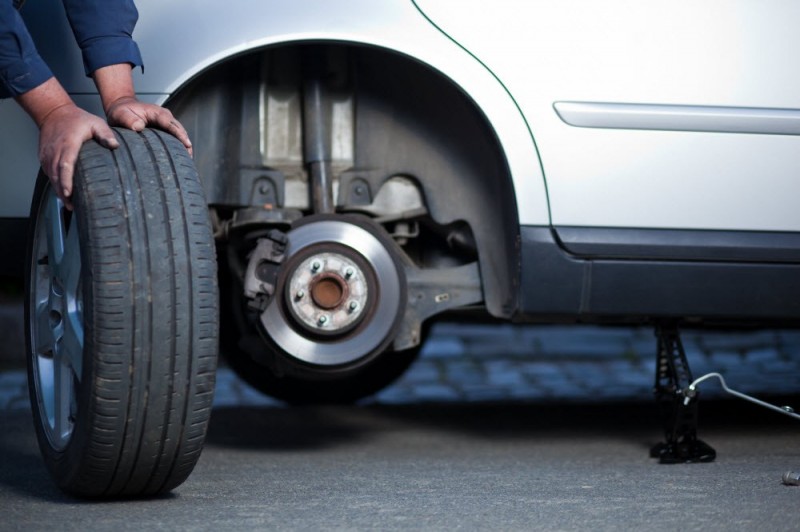How Long Will My Tires Really Last?

There is an ongoing argument about how long your car's tires will last. Car manufacturers and companies that sell and service tires say that you need to change all of your tires every 5-6 years regardless of how many miles you drive. But, car experts and consumer groups contend that the average car if well-constructed should last for 50,000 miles or 10 years, whatever comes first.
At Hamblin's Body Paint & Frame, we always believe in opting for safety over economy, but are people really changing tires before they have to? To find out, we Hamblin's Body Paint & Frame did our own research and due diligence in CA to get to the bottom of this tiring question.
A while back, the topic of aging tires hit the news in a big way when an in-depth investigation into the cause of the accident that killed the actor Paul Walker uncovered the fact that the Porsche Carrera GT in which he was riding was traveling on nine-year-old tires. The California Highway Patrol reported that the tires' age likely compromised its drivability and handling characteristics, according to an article in the LA Times.
For many years, car owners in Riverside, CA have relied on a tire's tread depth to verify its condition. But the rubber compounds in a tire will break down over time, regardless of its overall condition. An aging tire poses a safety hazard for drivers, passengers and pedestrians alike.
For many drivers in CA, old tires may never even remotely become a serious issue. If you drive a standard number of miles annually (12,000-15,000) a tire's tread will normally begin wear out in three to four years and long before the rubber compound will begin to deteriorate. But if you drive only 6,000 miles every year or have a vehicle that you only drive on the weekends, for example, replacing your tires won't be a major concern for quite some time.
How Long Does a Tire Truly Last?
 Let's get to the bottom line--companies that make cars, tires makers and rubber differ greatly in their opinions concerning the lifetime of your average tire. The National Highway Traffic Safety Administration (NHTSA) does not offer any detailed guidelines on tire aging and often defers to recommendations provided by the carmakers and the tire manufacturers themselves. Car companies like Nissan, Audi and Mercedes-Benz tell consumers to replace all four tires every six years after their production date, regardless of the tread. Tire makers such as Continental and Michelin claim that a tire can last up to a full decade, provided that you go through an annual tire inspection every four years.
Let's get to the bottom line--companies that make cars, tires makers and rubber differ greatly in their opinions concerning the lifetime of your average tire. The National Highway Traffic Safety Administration (NHTSA) does not offer any detailed guidelines on tire aging and often defers to recommendations provided by the carmakers and the tire manufacturers themselves. Car companies like Nissan, Audi and Mercedes-Benz tell consumers to replace all four tires every six years after their production date, regardless of the tread. Tire makers such as Continental and Michelin claim that a tire can last up to a full decade, provided that you go through an annual tire inspection every four years.
The Rubber Manufacturers Association declared many years ago that there is no way to figure out when a tire expires, due to differing factors such as heat, storage and conditions of use that can significantly reduce the life of a tire.
Here are the two main factors that can lead to tires failing on the road or aging prematurely:
Heat: NHTSA research has discovered that tires age more rapidly in hotter climates. NHTSA also learned that environmental conditions such as exposure to sunlight and coastal climates can accelerate the aging process. People who live in warm areas and coastal states should always keep this in mind when deciding whether they should retire a tire.
Usage: This refers to how the tire is treated on a daily basis. Is it correctly inflated? Has it hit the curb too many times? Has it ever been repaired or patched in anyway? Tires on a vehicle that's only driven on the weekends will have a dissimilar aging pattern than those on a car that's driven daily on the highway. All these varied factors contribute to how a tire wears out. To keep your tires safe and on the road, maintain the proper air pressure; have them rotated regularly and make certain to have them periodically inspected.
Sources: NHTSA, LA Times and the Rubber Manufacturers Association














 Let's get to the bottom line--companies that make cars, tires makers and rubber differ greatly in their opinions concerning the lifetime of your average tire. The National Highway Traffic Safety Administration (NHTSA) does not offer any detailed guidelines on tire aging and often defers to recommendations provided by the carmakers and the tire manufacturers themselves. Car companies like Nissan, Audi and Mercedes-Benz tell consumers to replace all four tires every six years after their production date, regardless of the tread. Tire makers such as Continental and Michelin claim that a tire can last up to a full decade, provided that you go through an annual tire inspection every four years.
Let's get to the bottom line--companies that make cars, tires makers and rubber differ greatly in their opinions concerning the lifetime of your average tire. The National Highway Traffic Safety Administration (NHTSA) does not offer any detailed guidelines on tire aging and often defers to recommendations provided by the carmakers and the tire manufacturers themselves. Car companies like Nissan, Audi and Mercedes-Benz tell consumers to replace all four tires every six years after their production date, regardless of the tread. Tire makers such as Continental and Michelin claim that a tire can last up to a full decade, provided that you go through an annual tire inspection every four years.
Social